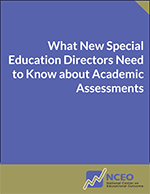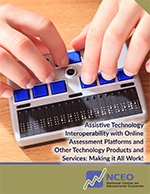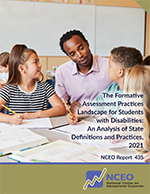Welcome
In this issue we highlight several new NCEO activities and products. The first article is about a toolkit for new state special education directors. The toolkit is designed to be easy to use and help new directors (and their staff) become experts on how to include students with disabilities in assessments. Next is an article about NCEO’s presence on TikTok. We are excited to use social media in new ways that reach a broader audience. There is also an article about the recently published proceedings of the forum on assistive technology interoperability with online assessment platforms and other technology and services that followed the National Conference on Student Assessment (NCSA). Additionally, there is an article about a recent scan of the national landscape of formative assessment definitions and how students with disabilities are included in them, as well as articles about NCEO presentations at the recent National Association of State Directors of Special Education (NASDSE) conference and at the upcoming Conference on Test Security (COTS).
– Sheryl Lazarus, NCEO Director
New Toolkit to Help Special Education Directors With Academic Assessments
What New Special Education Directors Need to Know about Academic Assessments is a toolkit for new state special education directors. It provides them with easy access to information to ensure students with disabilities participate in state, district, and school assessments and do so in a manner that is appropriate for each student’s instructional and assessment needs.
NCEO is on TikTok
NCEO launched a social media campaign in August for What New Special Education Directors Need to Know about Academic Assessments. To disseminate the toolkit, NCEO created a series of nine short form videos, often called Reels, that range from around a minute and a half to three minutes. NCEO chose to use the social media platform TikTok because it is centered around these short videos and is now one of the dominant social media platforms in the world.
NCEO Forum on Assistive Technology Interoperability with Online Assessment Platforms and Other Technology Products and Services
In June 2022, following the National Conference on Students Assessment (NCSA) in Atlanta, Georgia, NCEO, together with the Council of Chief State School Officers’ (CCSSO) Assessment, Standards, and Education for Students with Disabilities (ASES) Collaborative, hosted a forum titled Assistive Technology Interoperability with Online Assessment Platforms and Other Technology Products and Services: Making it All Work!
The Formative Assessment Practices Landscape for Students with Disabilities
Formative assessments are increasingly used to measure student progress towards desired learning outcomes and to determine which students may need additional instructional support. Yet not every state education agency (SEA) defines formative assessment in the same way and students with disabilities may not be explicitly included in formative assessment practices. The report The Formative Assessment Practices Landscape for Students with Disabilities: An Analysis of State Definitions and Practices, 2021 provides a scan of the national landscape of formative assessment definitions.
NCEO Presentations at NASDSE
NCEO recently participated in the 84th annual conference of the National Association of State Directors of Special Education (NASDSE) in St. Petersburg, Florida.
Upcoming NCEO at Conference on Test Security (COTS)
The 2022 Conference on Test Security (COTS) will be held in Princeton, New Jersey on October 26-28. This conference provides an opportunity for test security experts from a variety of organizations to share research and discuss important relevant issues. NCEO staff members will participate.
The Center is supported through a Cooperative Agreement (#H326G210002) with the Research to Practice Division, Office of Special Education Programs, U.S. Department of Education. The Center is affiliated with the Institute on Community Integration at the College of Education and Human Development, University of Minnesota. Consistent with EDGAR §75.62, the contents of this report were developed under the Cooperative Agreement from the U.S. Department of Education, but do not necessarily represent the policy or opinions of the U.S. Department of Education or Offices within it. Readers should not assume endorsement by the federal government.
Project Officer: David Egnor






